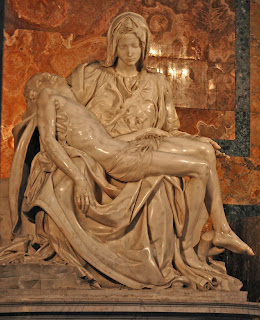This week has been an interesting week. Last week’s topic, that I discussed with the kids in the catechism classes, went over what the Catholic faith believes, who we believe in, why we believe, and where we get our information from. These are topics that I will discuss in the future. Today I would like to talk about why we believe. If you tuned in last week, I also touched upon this topic, but after a week of people asking this question, Why do you believe?; I felt compelled to pose this question, Who’s watching you?
In the year 2012, if one is questioned on their beliefs, a conversation amongst a group can be done peacefully and respectfully. Everyone has a variation on their belief. I like and appreciate that we can do this. We are not persecuted for our beliefs. We are not ridiculed for our beliefs. We can believe in whatever we wish for we have Freedom of Religion.
As individuals we support our religion because we have faith. What is faith?
Definition of FAITH according to the Merriam-Webster Dictionary
1
a : allegiance to duty or a person : loyalty
b (1) : fidelity to one’s promises (2) : sincerity of intentions
2
a (1) : belief and trust in and loyalty to God (2) : belief in the traditional doctrines of a religion
b (1) : firm belief in something for which there is no proof (2) : complete trust
3
: something that is believed especially with strong conviction; especially : a system of religious beliefs
— on faith
: without question [took everything he said on faith]
What phrases stand out to you? The phrases that stand out to me are “firm belief in something for which there is no proof … complete trust and …without question.
The same can be said for someone without faith, or someone who questions their faith. Does their faith exist? According to the definition, no. A person without faith, a person who does not believe, can not be faithful.
Regardless of whether or not you believe in a religion, it can not be denied that people are watching you. Our friends reflect upon our actions and our beliefs every day. Our children look up to us. People watch us. What are we showing them?
Those closest to me know, that over the last five years, I have embraced my faith. It is not that my faith was lacking before, but I hadn’t done a good job of walking the Christian path. I was in a state of being. Over time I realized that just being was not taking my life in the direction I envisioned or wished for myself. It was not until I decided to partake in the sacrament of Reconciliation that my path changed course.
In the Catholic faith, there are seven Sacraments. The sacrament of Reconciliation is also referred to as Penance. One reviews their prior actions in reflection against the ten commandments. If your actions go against God, they are referred to as sins. This reflection period is a time to acknowledge what you have done to go against God in your actions. These sins are confessed to a priest. The priest will offer guidance and direction on your actions. The priest will then ask if one is sorry for sinning against God. If you are, then one’s sins are forgiven by absolution which can only be given by an authorized priest.
In the Sacrament of Reconciliation, one receive God’s unconditional forgiveness. I found that during this process I have also strengthened my ability to forgive myself. I had never forgiven myself in the past. This for me was huge. In life we are hardest on ourselves.
If I forgive myself and acknowledge my sins and try my hardest to sin no more, I find it much easier and more likely to make choices that keep me in line with God’s law. I find it easier to want to walk in the footsteps of Jesus Christ. WWJD? You might have seen this a number of times, it stands for What would Jesus do? I find I use this phrase when I am trying to make a decision on something difficult. I ask this question because my actions are watched by God.
God is watching. Whether or not you believe in that statement, it does not change the fact that someone is watching you. Somewhere down the line, your actions may impact someone you know…and someone you might never meet. How can I impact someone I have never met? I’m happy that you asked. The Skit Guys will help us out with this.
Do you know who is watching you? On this Soulful Sunday, I leave you with this thought to marinate this week along with one of today’s readings. Heb 4:14-16 [Jesus Our High Priest] Jesus Christ, the Son of God, is the high priest who shares all our weaknesses, except sin. His mercy comes to all who seek it. A reading from the Letter to the Hebrews
Brothers and Sisters,
Since we have a great priest who has passed through the heavens, Jesus, the Son of God, let us hold fast to our confession. For we do not have a high priest who is unable to sympathize with our weaknesses, but one who has similarly been tested in every way, yet without sin. So let us confidently approach the throne of grace to receive mercy and to find grace for timely help.
-The word of the Lord.
-Thanks be to God.
Until then,
photo credit: Lawrence OP via photopin cc

